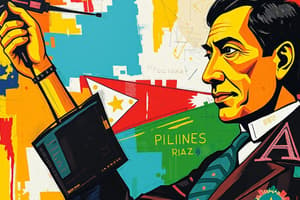Podcast
Questions and Answers
Jose Rizal is described as a mythical figure with divine descent.
Jose Rizal is described as a mythical figure with divine descent.
False (B)
The Rizal Law mandates the inclusion of courses on Jose Rizal's novels only in all educational institutions.
The Rizal Law mandates the inclusion of courses on Jose Rizal's novels only in all educational institutions.
False (B)
Senator Jose P. Laurel presented a substitute bill with the term 'compulsion' removed.
Senator Jose P. Laurel presented a substitute bill with the term 'compulsion' removed.
True (A)
The approval of Senate bill No. 438 by the House of Representatives took place on May 14, 1956.
The approval of Senate bill No. 438 by the House of Representatives took place on May 14, 1956.
The Rizal Law made reading the unexpurgated versions of Rizal's novels mandatory for elementary and secondary levels.
The Rizal Law made reading the unexpurgated versions of Rizal's novels mandatory for elementary and secondary levels.
Senator Lim suggested the exemption to those students who feel that reading Rizal's novels would positively affect his or her faith.
Senator Lim suggested the exemption to those students who feel that reading Rizal's novels would positively affect his or her faith.
Senator Primicias promulgates the rules and regulations in getting an exemption from reading all of Rizal's novels.
Senator Primicias promulgates the rules and regulations in getting an exemption from reading all of Rizal's novels.
Fidel Ramos directed CHEd and DECS to fully implement the law through CMO No. 3 in 1995.
Fidel Ramos directed CHEd and DECS to fully implement the law through CMO No. 3 in 1995.
Senate Bill No. 438 submitted to the Senate Committee of Education sought to make Noli Me Tangere and El Filibusterismo optional reading material in colleges and universities.
Senate Bill No. 438 submitted to the Senate Committee of Education sought to make Noli Me Tangere and El Filibusterismo optional reading material in colleges and universities.
Recto proposed nationalizing all Catholic schools in the Philippines if they closed due to the Rizal Law.
Recto proposed nationalizing all Catholic schools in the Philippines if they closed due to the Rizal Law.
Flashcards
Rizal's mythical status?
Rizal's mythical status?
False. Jose Rizal is not described as a mythical figure with divine descent.
Scope of the Rizal Law?
Scope of the Rizal Law?
False. The Rizal Law covers all educational institutions, but not exclusively Rizal's novels.
Laurel's substitute bill?
Laurel's substitute bill?
True. Senator Jose P. Laurel's substitute bill removed the term 'compulsion'.
Approval date of Senate Bill No. 438?
Approval date of Senate Bill No. 438?
Signup and view all the flashcards
Unexpurgated versions?
Unexpurgated versions?
Signup and view all the flashcards
Senator Lim's suggestion?
Senator Lim's suggestion?
Signup and view all the flashcards
Senator Primicias role?
Senator Primicias role?
Signup and view all the flashcards
Fidel Ramos involvement?
Fidel Ramos involvement?
Signup and view all the flashcards
Senate Bill No. 438?
Senate Bill No. 438?
Signup and view all the flashcards
Recto's Response?
Recto's Response?
Signup and view all the flashcards
Study Notes
Historical Context of the Rizal Law
- The Rizal Law was enacted to include courses on the life, works, and writings of José Rizal in all public and private schools, colleges, and universities.
- The law was established to promote Filipino identity, freedom, and nationalism after World War II.
Birth of Republic Act 1425
- April 17, 1956: Senator Jose P. Laurel presented a bill to the upper house, proposing the inclusion of Rizal's works in school curricula.
- May 14, 1956: Senate Bill No. 438 was approved by the House of Representatives.
- June 12, 1956: President Ramon Magsaysay signed the bill into law.
Proponents of the Law
- Senator Claro M. Recto
- Senator Jose P. Laurel
- The law aimed to restore hope and pride to the nation after World War II.
Opponents of the Law
- Rufino Cardinal Santos
- Sen. Lorenzo Tanada
- Francisco "Soc" Rodrigo
- Mariano Cuenco
- Decoroso Rosales
- Catholic Action of the Philippines
- Congregation of the Mission
- Knights of Columbus
- Catholic Teachers Guild
- Opponents argued that Rizal's novels are "anti-Catholic" and would compromise Catholic students' freedom of conscience.
Reasons for Opposition
- Rizal's novels were deemed "anti-Catholic" due to criticisms of the Medieval Church and its excesses.
- Opponents wanted an expurgated version of Rizal's novels to be taught in class, while keeping the unexpurgated version in school libraries.
- Catholic schools threatened to close if the law was enacted.
Counterarguments
- Senator Recto proposed nationalizing all Catholic schools in the Philippines if they closed due to the Rizal Law.
Studying That Suits You
Use AI to generate personalized quizzes and flashcards to suit your learning preferences.




